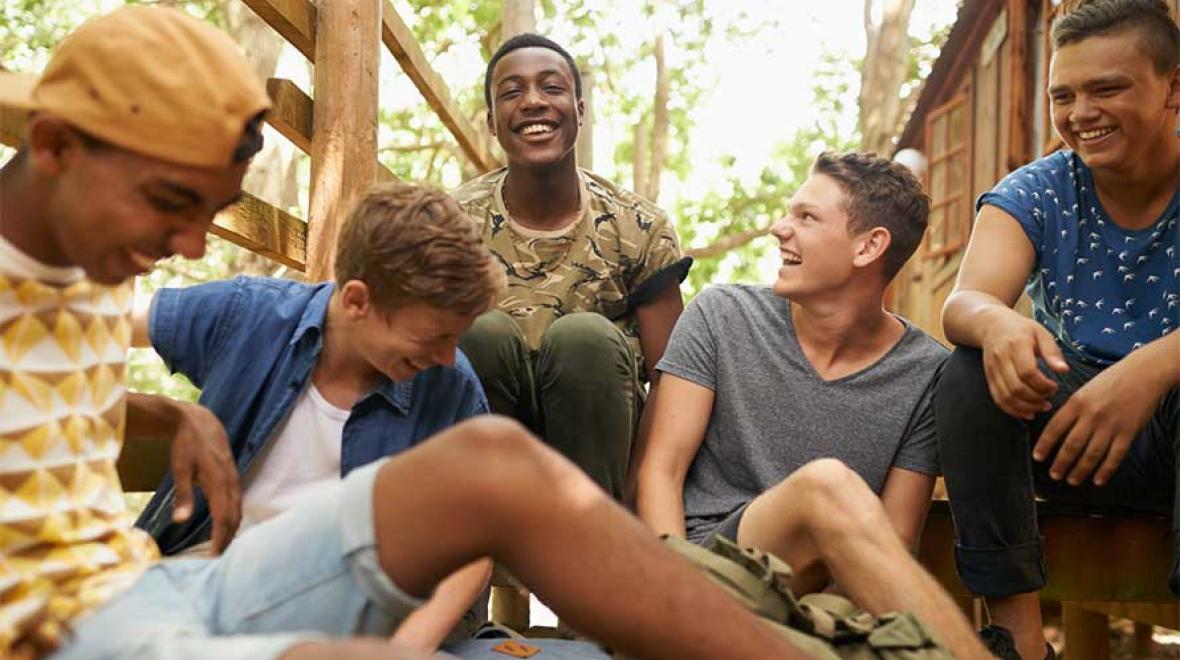
Jace Taylor, a recent local high school graduate, made headlines this month when news spread on social media that he was fired from his day camp counselor position at The Firs, a non-denominational Christian organization in Bellingham. Taylor had attended camps at The Firs for years when he was young, and had felt it was a good fit. He was excited to start this summer in his new role as counselor, but says The Firs abruptly let him go after seeing a social media post with a photo of him and his boyfriend.
Taylor’s story “not only highlights discrimination in camps for counselors, it brings up questions of inclusion for campers themselves,” says Kryss Shane, a leading expert on LGBTQ+ issues and inclusion policies. Summer camp can be a pivotal experience for youth, offering valuable opportunities to develop independence, resiliency, self-confidence and new skills. But even if camps want to be inclusive, this incident highlights the fact that not all camps are prepared to host LGBTQ+ campers. These kids are a special population with specific needs, Shane says. Here’s what LGBTQ+ families (and their friends) should look for when evaluating camp inclusivity.
Look for an inclusion or anti-discrimination statement. Look for a specific anti-discrimination statement on the camp website with words like “affirming” or “inclusive of all gender expressions or identities,” says Ann Gillard, Ph.D., a youth development and camp expert with 25 years’ experience working as a camp counselor, camp director, researcher and evaluator. From there, take a look at the parent information or FAQ page. “Most inclusive camps are proud to share their approach,” she says, and inclusive language gives you reason to explore further. Shane advises looking for the words “sexual orientation” and “gender identity/expression” in camp statements to confirm the camp is ready to host LGBTQ+ campers. If a camp is still fine-tuning new policies, it’s possible its website hasn’t been updated, so plan a phone call to double-check.
Confirm camp policies and philosophies with the director. If the website looks promising, set up a call with the camp director to discuss your particular situation and to find out more about the camp’s experience with LGBTQ+ campers. “Many camps are thinking through what it means to be inclusive and welcoming, and they want to do the right thing, but they want to talk with campers and their families about what that means,” Gillard says. Generally, she recommends that LGBTQ+ kids attend a camp with established LGBTQ+ training practices, but sometimes camps are in process.
Shane, a licensed mental health professional, advises a slightly different approach. She advocates not sending your child to a camp that isn’t fully prepared with LGBTQ+ training. She argues that if the director says the camp doesn’t have experience but they are willing to learn with your child, it isn’t the right place. “They may think a willingness to learn with the child is a positive thing to say — and it is well-intentioned — but it isn’t right for a child,” she cautions. “Don’t put your child in the position of being their teacher.” A camp’s insufficient experience can be dangerous for a child’s safety and mental health. She suggests parents encourage camps to hire an expert for guidance.
Realistically, youth camps might not have every protocol in place yet, but are on their way. If a child wants to attend a camp they’ve always attended or go to a camp their friend is going to, it might be worthwhile to talk with the camp director. The bottom line: proceed with caution in the absence of formal LGBTQ+ training, Gillard says.
Evaluate staff training and camp culture. If a camp is experienced working with LGBTQ+ campers, explore its protocols. The camp should be able to offer clear examples of how they handle various situations, Shane says. Ask what kind of training the camp staff has received for working with campers and camp staff of diverse genders. Ask what kind of support a camper can expect to receive from counselors. Find out if programming is gender-inclusive and minimizes gender-based assumptions about activity preferences. Ask how the camp has handled bunk assignments in previous seasons. Ask how privacy is assured — changing areas or bathrooms — and who will be told about your child’s personal information, Gillard says.
Prepare your child for what to expect. For any child, LGBTQ+ or not, camp can be exciting or scary, wonderful but challenging. “Prepare your child for the experiences they will have, many outside their comfort zone, without focusing solely on their LGBTQ+ identity,” Shane counsels. Also, help them decide what they want others to know about their gender or sexual orientation while at camp, and help them think through how they will handle and respond to questions from other campers, Gillard says. Finally, help them identify someone they can go to for help, if needed. Shane recommends sending kids with a code word so that if they contact you to let you know they’re feeling unwelcome or unsafe, they can communicate with you without drawing further attention to themselves from other campers or staff.
Finding the right camp where your child feels they belong could mean the difference between a cherished summer highlight and a deeply isolating experience. But it’s worth the work, because every child deserves the opportunity to go to summer camp.











